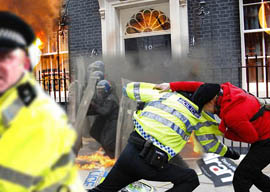
September 13, 2012

Democratic government’s plodding regularities are certainly superior to despotism or prolonged anarchy. But one can’t help feeling it would be character-building for our political classes if a mob were to come around and break their windows now and then. The Duke of Wellington had “about thirty” of his broken in 1831. (His servant “fired two blunderbusses in the air from the top of the house, and [the mob] went off.”)
There was a nasty spell of turbulence in the streets of British cities last year. The moving spirits of those riots were not ethnic English, though, but immigrant subgroups. The trouble actually started when police shot a black drug dealer. White English hooligans joined the party when looting opportunities opened up.
The perspicacious reader may detect here some continuity with last week’s column, in which I told you that white people are pussies, but absence of turbulence is not the same as pussiness. Once they had calmed down after the Reform Riots, the later-Victorian English were unprecedentedly nonturbulent, but they were not pussies.
My forefathers went on in that admirable spirit of unpussified nonturbulence for a century and more until the 1960s, when everything went wrong.
You can thus have an absence of turbulence without pussification. The converse, however, is not true. Pussies are never turbulent. Pussitude and nonturbulence are not independent variables, but so far as there is any arrow of causation in play, it points from the first to the second.
We should expect no turbulence among white people in the near future. Window-breaking there may be, but outside of a few remaining pockets of vitality such as Belfast, it won’t be whites lobbing the stones. Fattened by prosperity, soothed by the welfare state, and cowed by the missionaries of guilt, whites will limit their protests to voting for Tweedledum rather than Tweedledee, to genteel gatherings in rented halls, to comment threads on the dwindling number of news websites that still allow them.
And no, I won’t make any exceptions for the Slavs, in spite of a blizzard of angry emails from east of the Oder-Neisse Line last week. I can’t speak with confidence of Poles, Czechs, Bulgars, and Serbs, but the Russians’ last spasm of turbulence was in 1917. Perhaps mindful of how that turned out, they have retreated from turbulence into their immemorial traditions of sloth, fatalism, and drunkenness, with dire consequences for their total fertility rate.
As so often, Orwell nailed it: We”not only the English, but Europeans everywhere”have lost our turbulence.